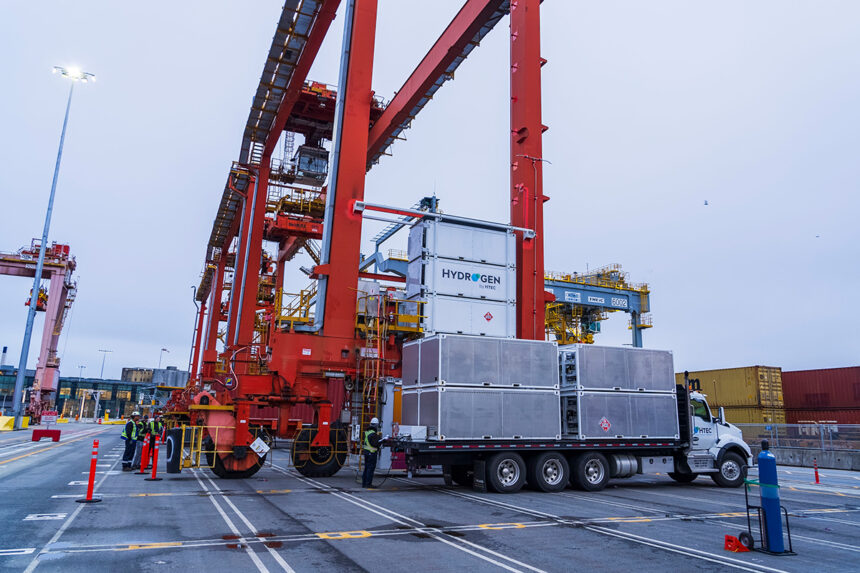DP World, based in Dubai, has moved to the second stage, a one -year field test that follows the successful completion of the first stage of the initial tests of its rubber porch crane (RTG), which works with hydrogen fuel cell.
The tests, which are expected to contribute significantly to the decarbonization of the world port operations of DP World, are carried out in the port of Vancouver in Canada. Dubai’s port and logistics company is now evaluating Electrying’s viability of its global fleet or 1,500 RTG cranes, traditionally driven by diesel.
DP World’s Green Shift
RTG cranes are essential for cargo management, but they are important taxpayers to greenhouse gas emissions. In the Vancouver terminal of DP World, 19 RTG cranes represent 50 percent of diesel consumption and generate more than 4,200 tons or co₂ annually.
The adoption of hydrogen technology promises to reduce drastically, or even eliminate, this impact.
The pilot project was launched in October 2023. In the first phase, a Diesel RTG, becomes modernized with an integrated solution that consists of a hydrogen-electrical generator (heg), battery energy storage system, hydrogen storage module, site capture, Yyyyyyyyyy Andutic.
Duration factory acceptance test, the system operated continuously for 16 hours, raising and lowering a load of 40 tons 105 times, emitting only steam or 400 kilograms of co₂ of a comparable diesel unit.
The RTG has now entered its second field test phase to track performance parameters, such as hydrogen consumption, energy generation and regenerative energy capture rates. These data will allow the equipment to compare the electric Hydrogen Electric RTG emissions with a traditional RTG with diesel in terms of productivity, reliability, maintainability, costs and environmental benefits.
Doug Smith, CEO of DP World in Canada, commented: “As one of the main ports of ports and terminals in the world, we are dedicated to advancing in sustainable practices that will boost the change of the entire industry. This pilot is not important that the bortant’s steps are staggered, but also establish a new reference point in sustainable logistics.
“The real world tests ensure that our solutions are reliable and effective and could open to the electrification of our Global RTG fleet.”
The RTG crane stores up to 135 kg of gas hydrogen compressed in 15 pressurized tanks. Hydrogen feeds on the fuel cell system, which loads a high voltage battery that feeds the electricity unit. The bidirectional energy system recovers energy by reducing containers, significantly reducing energy demand and improving operational efficiency.
DP World was associated with Tycrop Manufacturing, H2 Portable and Htec for this pioneering project. Portable H2, together with TYCROP, designed a hydrogen-electric generator (HEG) that uses a double fuel cell and a battery energy storage system, while HTC provided the hydrogen storage system and hydrogen supply.
Scott Mason, President and CEO, Tycrop, added: “Through our work with DP World, H2 Portable and Htec, we achieved an important milestone in the power of zero emissions. This achievement is aware of what can be dating. Always.” “
George Rubin, managing director of commercial operations, H2 Portable, added that his advanced energy system “exceeded the key reference points in early field operations” and demonstrated how hydrogen -based technology can offer significant performance benefits.
Depding in field tests, DP World will consider the conversion of its 25 RTG cranes with Diesel engine in Vancouver and Prince Rupert in an attempt to meet their zero emissions objectives. It also plans to try an electric terminal tractor in the port of Vancouver.
The Vancouver port was selected for the pilot due to the hydrogen ecosystem and fuel cells and strong support from the province of British Columbia.








